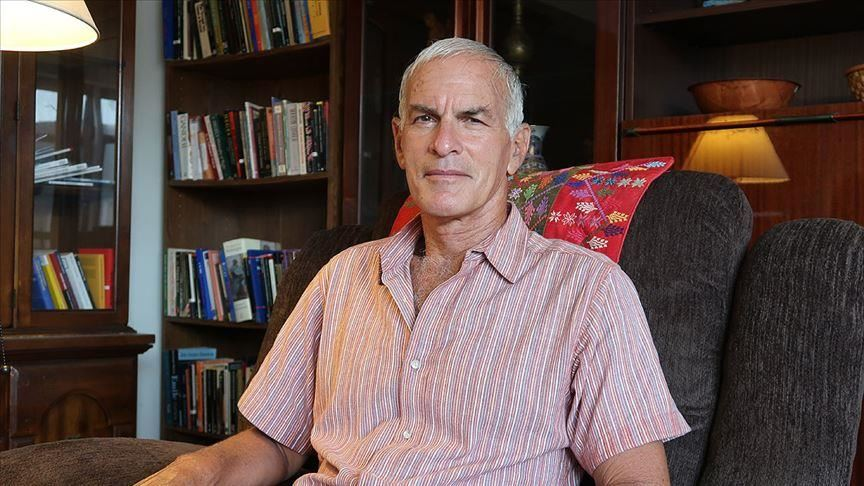Norman Finkelstein was born on December 8, Brooklyn, New York City in 1953 to Holocaust survivors Mary and Zacharias Finkelstein. Finkelstein's parents were Jewish Holocaust survivors. His mother grew up in Warsaw and survived the Warsaw Ghetto and the Majdanek concentration camp. His father was a survivor of both the Warsaw Ghetto and Auschwitz. After the war they met in a displaced persons camp in Linz, Austria, and then emigrated to the United States, where his father became a factory worker and his mother a homemaker and later a bookkeeper. Finkelstein's mother was an ardent pacifist.
Finkelstein has said of his parents that "they saw the world through the prism of the Nazi Holocaust. They were eternally indebted to the Soviet Union (to whom they attributed the defeat of the Nazis), and so anyone who was anti-Soviet they were extremely harsh on".
Finkelstein grew up in Borough Park, then Mill Basin, both in Brooklyn, New York, where he attended James Madison High School. In his memoir he recalls strongly identifying with the outrage that his mother, who witnessed the genocidal atrocities of World War II, felt at the carnage the United States wrought in the Vietnam War.
He attended James Madison High School followed by Binghamton College, where he graduated in 1974 with a degree in History. Finkelstein enrolled at Princeton University where he earned a Master's degree in political science and a PhD in political studies in 1988. He also studied at the École Pratique des Hautes Études in Paris.
As a young man, Finkelstein identified as a Maoist and worked for The Guardian, a Maoist newsweekly. After the 1981 trial of the Gang of Four, Finkelstein had a falling out with Maoist politics.
Following this experience, Finkelstein decided to develop his worldview with meticulous scholarship. Finkelstein recounts spending an entire summer in the New York Public Library comparing historical population records of Palestine to the claims made in the Joan Peters Zionist text "From Time Immemorial".
Finkelstein's work largely debunked the text, which was well-regarded at the time, winning the National Jewish Book Award in 1985. Finkelstein's skepticism of scholarship regarding the Israel-Palestine conflict would continue to characterize his academic career.
In 2003, Alan Dershowitz published "The Case for Israel", which Finkelstein called "a collection of fraud, falsification, plagiarism, and nonsense". Dershowitz began campaigning to block Finkelstein's tenure bid at DePaul University. In 2007, Finkelstein was denied tenure at DePaul University. In response, Finkelstein resigned, and students staged a sit-in and hunger strike in protest.
In 2008, Finkelstein was denied entry to Israel. In 2009, a documentary film about Finkelstein's life and career was published, titled "American Radical: The Trials of Norman Finkelstein".
"My parents often wondered why I would grow so indignant at the falsification and exploitation of the Nazi genocide. The most obvious answer is that it has been used to justify criminal policies of the Israeli state and US support for these policies."
- Norman Finkelstein
Norman Finkelstein - Israel and Palestine


An Unpopular Man - Norman Finkelstein, TNR 
FINKELSTEIN: Misadventures in the Class Struggle - 
Megathreads and spaces to hang out:
- ❤️ Come listen to music and Watch movies with your fellow Hexbears nerd, in Cy.tube
- 💖 Come talk in the New Weekly Queer thread
- 💛 Read and talk about a current topics in the News Megathread
- 💚 Come and talk in the Daily Bloomer Thread
- ⭐️ September Movie Nominations ⭐️
reminders:
- 💚 You nerds can join specific comms to see posts about all sorts of topics
- 💙 Hexbear’s algorithm prioritizes comments over upbears
- 💜 Sorting by new you nerd
- 🌈 If you ever want to make your own megathread, you can reserve a spot here nerd
- 🐶 Join the unofficial Hexbear-adjacent Mastodon instance toots.matapacos.dog
Links To Resources (Aid and Theory):
Aid:
Theory:

i so wish i was one if those polyglots
i hate it when they do an accent joke between languages i dont know well enough to appreciate that its silly
watch foreign tv shows
In all seriousness how do you do this and pick up a language
Because I feel like you have to have a solid baseline fluency to even understand anything
I know sub-conversational Spanish but I can't understand tv shows or movies enough to stay focused
I think if there's such a thing as baseline fluency, TV is how you get it. When we started studying English as a second language in school, it was glaringly obvious that kids who watched a lot of English language TV, of which 100% was subtitled, had a huge head start.
Formal education normally focuses on written language, which lets you read a paragraph at your own pace, and you have time to actively reason and make educated guesses. This lets you score points on tests, but can leave you unprepared for even simple normal convos. Spoken language did fine on its own for thousands of years before writing was invented.
Being able to parse someone speaking quickly in real time, you don't have time to actively analyze things, so it requires mechanical skill which must happen automatically, and can only be developed through extensive practice.
As babies, we spend years internalizing the grammar of our mother tongues, and goo-goo-ga-ga-ing to try to establish connections between what our ears hear and what our mouths should do. As adults we can speed up this process by looking at the tables in articles like X phonology and X orthography while goo-goo-ga-ga-ing minimal pairs to ourselves. I think if you make an effort to get that right from the start you save so much confusion, both short and long term.
TL;DR: Listening is the fundamental skill. You can study abstract grammar and vocab all day, but listening is a mechanical skill that must be developed by listening a lot.
Hmm good points, I'll check out some Spanish media again and see if I can get into it